#Paquito D’Rivera
Explore tagged Tumblr posts
Text
LÉGENDES DU JAZZ
PAQUITO D’RIVERA, AMBASSADEUR DES MUSIQUES DU MONDE
‘’Music was in my soul and in my heart. I never had the idea to do anything else."
- Paquito D’Rivera
Né le 4 juin 1948 à La Havane, à Cuba, Francisco de Jesús Rivera Figueras était le fils de Francisco ‘’Tito’’ D'Rivera, un saxophoniste classique et chef d’orchestre qui vendait également des instruments de musique. C’est aussi le père de D’Rivera qui lui avait fait connaître les disques de Duke Ellington et de Benny Goodman. Le père de D‘Rivera l’emmenait aussi dans des clubs comme le Tropicana et à des concerts.
Enfant prodige, D’Rivera avait commencé à suivre des cours de théorie et de saxophone avec son père à partir de l’âge de cinq ans. L’année suivante, D’Rivera avait participé à son premier concert et avait interprété une composition écrite par son père. À l’âge de sept ans, D’Rivera était devenu le plus jeune musicien de l’histoire à endosser les célèbres saxophones Selmer. D’Rivera avait seulement dix ans lorsqu’il s’était produit avec le National Theater Orchestra de La Havane en 1958. Formé initialement pour jouer du saxophone soprano, D’Rivera était par la suite tombé en amour avec le saxophone alto et avait appris à jouer de cet instrument en autodidacte avec l’aide d’un manuel.
À l’âge de seulement douze ans en 1960, D’Rivera était entré au Conservatoire de musique de La Havane, où il avait suivi des cours de saxophone, de clarinette et de composition. C’est aussi durant ses études au conservatoire que D’Rivera avait rencontré le pianiste Chucho Valdés pour la première fois. Cinq après son entrée au conservatoire, D’Rivera avait été soliste invité avec le Cuban National Symphony Orchestra dans le cadre d’un concert qui avait été radiodiffusé à travers le pays en 1965. D’Rivera avait continué de jouer avec plusieurs groupes au cours de son adolescence, dont le Cuban Army Band, avant de co-fonder l’Orchestra Cubana de Música Moderna avec Valdés. D’Rivera avait d’ailleurs dirigé l’orchestre pendant deux ans.
DÉBUTS DE CARRIÈRE
En 1973, D’Rivera avait co-fondé avec Valdés le groupe Irakere, qui fusionnait le jazz, le rock, la musique classique et les rythmes afro-cubains. Composé de trois membres de l’Orchestra Cubana de Música Moderna et de trois autres musiciens, le groupe était devenu extrêmement populaire après s’être produit dans le cadre des festivals de jazz de Newport et de Montreux.
En 1979, le groupe avait remporté un prix Grammy dans la catégorie du meilleur enregistrement de jazz latin pour son premier album éponyme. La même année, le groupe s’était produit aux côtés de musiciens de rock et de jazz dans un festival appelé Havana Jam. Les performances du groupe avaient été enregistrées et avaient éventuellement donné lieu à la publication des albums Havana Jam et Havana Jam II (1979), faisant ainsi du groupe le premier ensemble cubain de l’époque post-Catro à signer un contrat avec une compagnie américaine.
De plus en plus insatisfait des contraintes imposées à la pratique de la musique par les autorités cubaines, D’Rivera avait expliqué qu’après avoir fait la rencontre de Che Guevara, son désir de quitter Cuba s’était encore intensifié. Au début de 1980, alors qu’il était en tournée en Espagne, D’Rivera s’était rendu à l’ambassade des États-Unis et avait demandé l’asile politique. D’Rivera avait laissé sa femme et son enfants à Cuba, après leur avoir promis de les faire venir aux États-Unis.
Dès son arrivée aux États-Unis, D’Rivera avait obtenu un grand soutien pour lui et sa famille. Sa mère, Maura, et sa soeur, Rosario, se trouvaient déjà aux États-Unis à l’époque. Elles avaient quitté Cuba en 1968 et étaient devenus citoyennes américains. Sa mère Maura avait travaillé aux États-Unis dans l’industrie de la mode, et sa soeur Rosario était devenue une artiste et femme d’affaires respectée. Après avoir obtenu sa résidence permanente, D’Rivera avait joué avec Dizzy Gillespie, David Amram, Mario Bauza et d’autres musiciens américains bien connus.
D’Rivera s’était particulièrement fait connaître après la publication de ses deux premiers albums, Paquito Blowin' (juin 1981) et Mariel (juillet 1982). Il avait aussi été en vedette dans le Time Magazine et dans des émissions de télévision comme CBS Sunday Morning.
Avec Gillespie, D’Rivera avait participé à la fondation du United Nations Orchestra en 1988, un groupe de fusion de quinze musiciens qui faisait la synthèse entre le jazz et la musique latine. La même année, D’Rivera avait joué comme soliste avec le National Symphony Orchestra et le Brooklyn Philarmonic Orchestra.
En 1991, toujours comme membre du big band de Gillespie, D’Rivera avait participé aux côtés de James Moody, Slide Hampton, Airto Moreira, Flora Purim, Arturo Sandoval et Steve Turre à l’enregistrement de l’album Live at the Royal Festival Hall.
En plus de ses collaborations avec l’orchestre de Gillespie, D’Rivera s’était produit avec de nombreux autres groupes, dont Triangulo, qui jouait du calypso et de la salsa, et le Caribbean Jazz Project. D’Rivera avait également formé deux groupes qui combinaient sa passion pour le jazz et la musique classique, le Paquito D'Rivera Big Band et un groupe de musique de chambre appelé le Paquito D'Rivera Quintet. D’Rivera avait aussi commencé à composer pour d’autres groupes, dont le Gerald Danovich Saxophone Quartet de Montréal (qui a enregistré sa célèbre ‘’New York Suite’’), le Caracas Clarinet Quartet, le Cuarteto Latinoamericano, le Quinteto D’Elas et le Aspen Wind Quintet.
ÉVOLUTION RÉCENTE
D'Rivera avait continué d’enregistrer et de se produire en concert durant les années 1990 et 2000. En 1999, D'Rivera s’était produit à la Maison-Blanche et au Kennedy comme artiste invité dans le cadre du concert Americanos. En 2000, D’Rivera avait publié les albums Music From Two Worlds et Habanera. Brazilian Dreams avait suivi en 2002. En 2001, D’Rivera avait aussi été un des principaux solistes du film Calle 54 du réalisateur Fernando Trueba.
En 2003, D'Rivera avait remporté ses cinquième et sixième prix Grammy, respectivement pour les albums Brazilian Dreams et Historia del Soldado. En 2017, D'Rivera avait publié l’album Paquito D’Rivera presents the Vitral String Quartet. L’album comprenait trois compositions de D’Rivera intitulées ‘’Afro’’, ‘’Wapango’’ et ‘’Kites Over Havana.’’ Dans son compte rendu de l’album, le New York City Jazz Record écrivait:
“In the realm of chamber music, string and brass quartets are a well-established tradition, which allow the melodic colors of their instrumentation to weave a deeply satisfying harmonic tapestry…The Vitral Saxophone Quartet (Oscar Gongora: soprano; Roman Filiu: alto; Alejandro Rios: alto and tenor; Raul Cordies: baritone) is a prime example of the beauty that four saxophones can produce. Kites Over Havana is a gorgeous entry into the canon.”
Reconnu pour son travail de musicien et de compositeur tant dans les domaines du jazz que de la musique classique, D'Rivera avait également décroché plusieurs commandes, notamment pour sa composition "Gran Danzon (The Bel Air Concerto)’’, un concerto pour flûte qui lui avait été commandé par le Rotterdam Philharmonic et le National Symphony Orchestra, et qui avait été présenté en grande première au Kennedy Center for the Performing Arts de Washington, D.C., en 2002. Le critique Joe Banno avait écrit au sujet de l’oeuvre dans le Washington Post en février 2002: ‘’... Best that night was Paquito D’Rivera’s Grand Danzon (The Bel Air Concerto) in its world premiere. A spiky and imaginatively colored piece of Latin American orchestral writing.’’ L’oeuvre avait de nouveau été présentée par le Baltimore Symphony Orchestra au Lincoln Center en avril 2006. En 2000, le Jazz at Lincoln Center avait également commandé à D’Rivera une "Pan American Suite" dans le cadre de la série As of Now. L’oeuvre avait éventuellement été diffusée sur le réseau NPR.
D’Rivera est également l’auteur d’une sonate pour clarinette intitulée ‘’The Cape Cod Files’’. L’oeuvre, qui avait été commandée à D’Rivera par le Cape Cod Chamber Music Festival en 2009, a été présentée en grande première par la Silicon Valley Symphony en mai 2011. D’Rivera avait également composé pour le Turtle Island String Quartet, le Ying Quartet et l’International Double Reed Society. En 2002, la Bibliothèque nationale du Congrès avait commandé à D’Rivera ‘’Fiddle Dreams’’, une fantaisie pour violon et piano qui avait été écrite en hommage à la violoniste Regina Carter.
La composition de D'Rivera, ‘’Lady in White’’ a été présentée sous forme de ballet par la José Limón Dance Company en 2012. En 2019, le concerto pour trompette de D’Rivera ‘’Concerto Venezolano’’ a été présenté en première à Mexico City par l’Orquesta de Mineria dirigée par Miguel Prieto. Le soliste était Pacho Flores, pour qui l’oeuvre avait été composée. En juin 2022, le New Jersey Symphony Orchestra avait également présenté un Concerto pour cor français qui comprenait des mouvements écrits par quatre compositeurs, dont D’Rivera. L’orchestre était dirigé par Xian Zhang. Le soliste était Chris Komer. Parmi les autres concertos de D’Rivera, on remarquait ‘’Conversations with Cachao’’. Concerto pour contrebasse et saxophone, l’oeuvre qui rendait hommage au légendaire contrebassiste cubain Israël ‘’Cachao’’ Lopez, avait été présentée en grande première à Caramoor en juin 2007. Une autre composition récente de D’Rivera était intitulée "Three Poems from the New World", et s’inspirait des oeuvres de Fortunato Villarrondo, José Martí et Dana Gioia. Les trois poèmes qui exploraient les thèmes de l’intolérance raciale, de la haine et de l’injustice, tentaient de leur substituer des valeurs comme l’amitié, l’amour et le respect de la vie.
D'Rivera avait aussi été artiste en résidence au New Jersey Performing Arts Center, et directeur artistique de la New Jersey Chamber Music Society. Il a également été compositeur en résidence au Caramoor Center for Music and the Arts en 2007. Depuis 1995, D'Rivera est aussi directeur artistique du Festival International de Jazz en el Tambo en Uruguay. Il est aussi directeur artistique du Duke Ellington Festival de Washington, D.C.
Parallèlement à ses autres activités, D'Rivera continue régulièrement de se produire en tournée avec différents groupes à travers le monde, dont le Paquito D'Rivera Big Band, the Paquito D'Rivera Quintet et le Chamber Jazz Ensemble. Le groupe régulier de D'Rivera, le Paquito D'Rivera Quintet, est formé du trompettiste argentin Diego Urcola, du pianiste Alex Brown, du contrebassiste péruvien Oscar Stagnaro et du batteur Mark Walker. Le groupe s’est mérité un prix Grammy pour le meilleur album de jazz latin en 2001.
D'Rivera a aussi fait de fréquentes apparitions comme soliste invité avec des orchestres comme le London Philharmonic et la Costa Rican National Symphony. Parmi les autres orchestres avec lesquels D'Rivera avait collaboré, on remarquait le National Symphony Orchestra, le Warsaw Philharmonic Orchestra, le Florida Philharmonic Orchestra, le Baltimore Symphony, le Bronx Arts Ensemble, le Puerto Rico Symphony Orchestra, le YOA Orchestra of the Americas, l’American Youth Philharmonic et le Simón Bolívar Symphony Orchestra.
D'Rivera a publié une autobiographie intitulée Mi Vida Saxual (My Sax Life) en 2005. Le prologue de l’ouvrage avait été écrit par l’écrivain cubain Guillermo Cabrera Infante. Également auteur, D’Rivera a publié une nouvelle intitulée ‘’En tus brazos morenos.’’
D'Rivera vit actuellement à North Bergen, New Jersey, avec son épouse, la chanteuse Brenda Feliciano. Le fils de D'Rivera, Franco, est également compositeur et a collaboré avec son père dans le cadre de compositions pour l’American Saxophone Quartet de New York.
D'Rivera avait toujours rêvé de réaliser une sorte de symbiose entre ses deux passions: le jazz et la musique classique. Les prix qu’il avait remportés et le respect dont il avait bénéficié tant dans le domaine du jazz que de la musique classique semblent démontrer qu’il avait parfaitement atteint cet objectif. En fait, D’Rivera était devenu si renommé comme compositeur classique que le Kammer Orchester Schloss Werneck avait développé en 1999 une série intitulée ‘’Paquito & Mozart’’ dans laquelle ses compositions de musique de chambre avaient été présentées aux côtés de celles de Wolfgang Amadeus Mozart ! Le point culminant du concert était un Adagio composé par D’Rivera qui comportait des éléments du concerto pour clarinette en A Majeur de Mozart. Peter Linhart écrivait dans le Main Echo Aschaffenburg de Montag en juin 1999: ‘’The orchestra as well as the soloist executed the work with perfect intonation and precise interpretation. At no time came the impression that two different musical worlds were colliding. The concert was an offering of excellence by virtue of the soloist and the orchestra, led by Ulf Klautsenitzer. With a focused tone and intonation, he effortlessly graced through the various registers unwavering...’’ En 2000, D’Rivera avait également obtenu une nomination aux prix Grammy pour son album Music of Two Worlds, qui comprenait ses propres compositions aux côtés de celles de Schubert, Brahms, Guastavino et Villa Lobos.
Excellant également dans le domaine bebop, D'Rivera est le seul artiste à avoir remporté des prix Grammy dans les catégories de jazz latin et classique en 2003. D'Rivera a également été juge lors du 5e et du 8e gala des Independent Music Awards destinés à récompenser le travail des artistes indépendants.
Paquito D'Rivera a remporté de nombreux honneurs au cours de sa carrière. En 1991, dans le cadre d’une performance à Carnegie Hall, la National Hispanic Academy of Media Arts and Sciences avait décerné à D'Rivera un Lifetime Achievement Award pour sa contribution à la musique latine. En 1999, à l’occasion de son 500e anniversaire, la Universidad de Alcala de Henares avait accordé à D’Rivera un prix spécial afin de souligner sa contribution aux arts, son humanisme et sa défense des droits et des libertés des artistes à travers le monde.
D’Rivera a été élu ‘’Jazz Master’’ par la National Endowment for the Arts en 2005. D’Rivera avait accepté son prix en lisant la déclaration suivante:
"Since I was a kid, my father, a classical tenor who loved jazz, introduced me to the music of Lionel Hampton, Count Basie, Benny Carter and Teddy Wilson. Later on I grew up listening to the likes of Dizzy Gillespie, Benny Golson, Max Roach, Ella, Sarah {Vaughan}, Carmen {McRae}, Dave Brubeck, The Heath Brothers, Gil Evans, Clark Terry and Jackie McLean. Now, 50 years after my first public performance, it feels like an incredible dream, to share the NEA Jazz Masters distinction with these giants that gave my life meaning."
Toujours en 2005, le gouvernement américain avait décerné à D’Rivera la National Medal of Arts. Nommé clarinettiste de l’année par la Jazz Journalists Association en 2004 et 2006, D'Rivera a également été nommé Living Jazz Legend Award par le Kennedy Center de Washington, D.C., en 2007. D’Rivera est aussi récipiendaire d’un President's Award de l’International Association for Jazz Educators en 2008. En 2009, D’Rivera avait également été décoré de la médaille d’honneur du National Arts Club. L’année suivante, le Spelman College avait décerné à D’Rivera un African-American Classical Music Award.
En 2017, D’Rivera a aussi remporté un Bogomolny National Service Award de la Chamber Music America en reconnaissance de ses efforts pour inspirer les nouvelles générations de musiciens. La National Hispanic Academy of Media Arts and Sciences a également rendu hommage à D'Rivera en lui décernant un Achievement in Music Award. D’Rivera a remporté huit prix Grammy au cours de sa carrière.
Lauréat d’une bourse de composition de la Fondation Guggenheim en 2007, D'Rivera s’est aussi mérité plusieurs doctorats honorifiques, provenant d’institutions aussi prestigieuses que le Berklee College of Music (2003), la State University of New York à Old Westbury (2012), la Manhattan School of Music, l’Université de Pennsylvanie, la City University of New York (CUNY) et l’Universidad de Alcalá de Henares, en Espagne.
Toujours très attaché à son pays d’origine, D'Rivera avait sévèrement critiqué le guitariste Carlos Santana pour avoir porté un T-shirt à l’effigie de Che Guevara lors du gala des Academy Awards en 2005. Dans sa lettre, D'Rivera avait rappelé le rôle joué par Guevara dans l’éxécution de contre-révolutionnaires cubains, dont celle d’un de ses cousins.
D’Rivera avait toujours rêvé de devenir musicien et n’avait jamais songé à faire autre chose. Comme il l’avait déclaré en entrevue, ‘’Music was in my soul and in my heart. I never had the idea to do anything else." D’Rivera a enregistré plus de trente albums sous son nom au cours de sa carrière. Sur son site internet, la National Endowment of the Arts avait écrit au sujet de D’Rivera: ‘’He has become the consummate multinational ambassador, creating and promoting a cross-culture of music that moves effortlessly among jazz, Latin and Mozart.’’
©-2024, tous droits réservés, Les Productions de l’Imaginaire historique
SOURCES:
‘’Paquito D’Rivera.’’ Wikipedia, 2023.
‘’Paquito D’Rivera.’’ All About Jazz, 2023.
‘’Paquito D’Rivera.’’ National Endfowment for the Arts, 2023.
‘’Paquito D’Rivera Biography.’’ Net Industries, 2023.
2 notes
·
View notes
Text
Chucho Valdés Trio Live in NYC (Full Concert) | Jazz Icons at Trinity Church, Wall Street

Chucho Valdés Trio Live in NYC (Full Concert) | Jazz Icons at Trinity Church, Wall Street.
https://www.youtube.com/watch?v=Zqfmo0ZlyCw Chucho Valdés Trio. Cuban pianist, composer, and arranger Cuban pianist, composer, and arranger Chucho Valdés is the most influential figure in modern Afro-Cuban jazz. He is perhaps best known for helming the iconic Cuban ensemble Irakere (1973–2005). In a career spanning more than 60 years, Valdés has distilled elements of the Afro-Cuban music tradition, jazz, classical music, rock, and more into a deeply personal style. He is joined by bassist Jose Armando Gola and percussionist Roberto Vizcaíno Jr. for what is sure to be a transcendent performance. The concert is presented in collaboration with JAZZ HOUSE KiDS.

Winner of seven GRAMMY® and five Latin GRAMMY® Awards, Mr. Valdés, received a Lifetime Achievement Award from the Latin Academy of Recording Arts & Science last year and was also inducted into the Latin Songwriters Hall of Fame. Mr. Valdés celebrated his 80th birthday on October 9, 2021, completing La Creación (The Creation), a three-movement suite for a small ensemble, voices, and a big band. The piece, the most ambitious work of his career, tells the history of Creation according to the Regla de Ocha, the Afro-Cuban religion known as Santería.

The Creation was a commission of the Adrianne Arsht Center for the Performing Arts of Miami-Dade County, the John F. Kennedy Center for the Performing Arts in Washington, DC, the Chicago Symphony Center, and the Los Angeles Philharmonic Association. It had its world premiere on November 5, 2021, at the Adrienne Arsht Center.

Performances followed in several U.S. cities, including Jazz at Lincoln Center in New York City, the Detroit Jazz Festival in Detroit, MI, and the Monterey Jazz Festival, in Monterey, CA. In Europe, the tour began at the Philharmonie in Paris and included performances in Berlin, London, Hamburg, Lyon, and Barcelona (Mr. Valdés is the godfather of the International Jazz Festival). Another significant recent development was the long-awaited reunion with his old friend and co-conspirator in many musical adventures, the extraordinary clarinetist, saxophonist, and composer Paquito D’Rivera. They have rarely played together for the past 40 years, and since their reunion, they have wasted no time. In January 2022, they recorded an album entitled I Missed You Too, and embarked on a tour with their Reunion Sextet that took them to Europe and the United States. Born in a family of musicians in Quivicán, Havana province, Cuba, on October 9, 1941, Dionisio Jesús “Chucho” Valdés Rodríguez, has distilled elements of the Afro-Cuban music tradition, jazz, classical music, and rock into an organic, deeply personal style. His first teacher was his father, the pianist, composer, and bandleader Ramón “Bebo” Valdés. By the age of three, Mr. Valdés was already playing on the piano melodies he heard on the radio — using both hands and on any key. He began taking lessons on piano, theory, and solfege at the age of five. He continued his formal musical education at the Conservatorio Municipal de Música de la Habana, from which he graduated at 14. A year later, Mr. Valdés formed his first jazz trio. In 1959, he debuted professionally with the band Sabor de Cuba. The ensemble, directed by his father, is widely considered one of the great orchestras in modern Cuban music. Fittingly, Mr. Valdés made his early mark as the founder, pianist, and leading composer and arranger of another landmark ensemble: the small big band Irakere (1973-2005). With its audacious mix of Afro-Cuban ritual music, Cuban dance music, jazz, classical music, and rock, Irakere marked a before and after in Latin jazz. Irakere’s self-titled debut recording in the United States won a Grammy as Best Latin Recording in 1979. While he remained with Irakere until 2005, Mr. Valdés launched a parallel career in 1998 both as a solo performer and a small-group leader. It marked the beginning of an enormously fruitful period highlighted by albums such as Solo Piano (Blue Note, 1991), Solo: Live in New York (Blue Note, 2001), as well as quartet recordings such as Bele Bele en La Habana (Blue Note, 1998), Briyumba Palo Congo (Blue Note, 1999), New Conceptions (Blue Note, 2003), and Live at the Village Vanguard (Blue Note, 2000), which won a Grammy for Best Latin Jazz Album. After leaving Irakere, Mr. Valdés also won Grammys for Juntos Para Siempre (Calle 54, 2007), the duet recording with his father, Bebo; and, Chucho’s Steps (Comanche, 2010), which introduced his new group, the Afro-Cuban Messengers. But such success didn’t mean forgetting past achievements. In 2015, Mr. Valdés celebrated the 40th anniversary of the birth of Irakere, his iconic band, with a world tour. Tribute to Irakere: Live at Marciac (Jazz Village / Comanche Music), which captured a performance on that tour, won a Grammy for the Best Latin Jazz Album in 2016. He also won a Latin Grammy as Best Latin Jazz album for Jazz Batá 2, in which he revisited a revolutionary idea Mr. Valdés first recorded in 1972: a piano jazz trio featuring batá drums. In 2022, Chucho Valdés won a Grammy and a Latin Grammy for Mirror Mirror, an album of duets by pianist and singer Eliane Elias with Mr. Valdés and the great late pianist Chick Corea. Read the full article
#SMLPDF#noten#partitura#sheetmusicdownload#sheetmusicscoredownloadpartiturapartitionspartitinoten楽譜망할음악ноты#spartiti
0 notes
Text
Sergio Pamies TIME TO SAY
SERGIO PAMIES TIME TO SAY Newtrad Records Sergio Pamies, piano; Ricky Rodgriguez, bass; Jimmy Macbride, drums; Samuel Torres, percussion; Marshall Gilkes, trombone; Michael Thomas, alto & soprano saxophones; Alex Norris, trumpet /flugelhorn. GUEST ARTISTS: Dave Liebman, soprano saxophone; Paquito D’Rivera, clarinet. The title tune of this album encompasses Straight-ahead, Latin jazz, and high…

View On WordPress
0 notes
Text
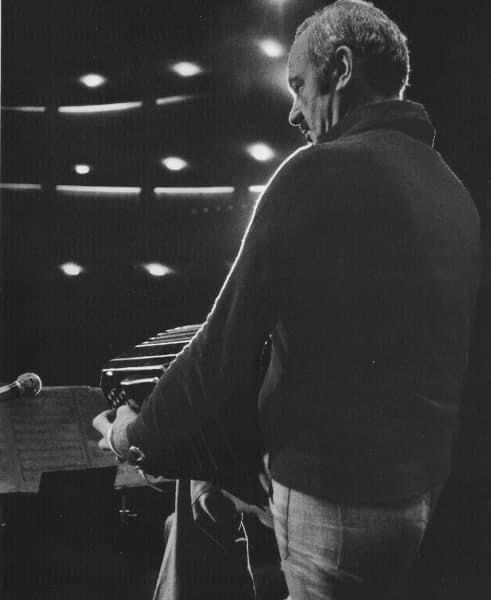
Estoy harto de escuchar que lo que hago no es tango. Y como estoy harto les digo que esta bien, que lo que hago es música de Buenos Aires. Pero la música de Buenos Aires cómo se llama? Tango, entonces lo.que hago es Tango.
- Astor Piazzolla
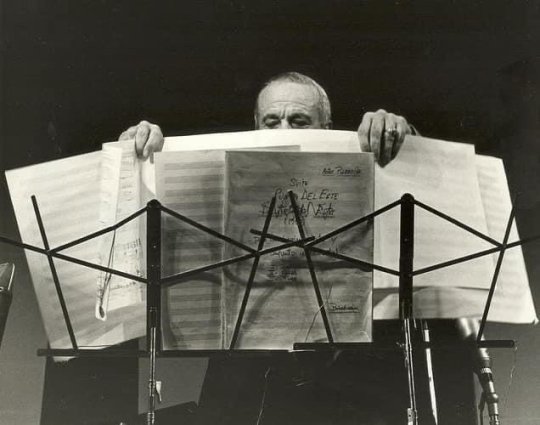
Un día como hoy 11 de marzo, en 1921, en Mar del Plata, Provincia de Buenos Aires nacía uno de los más grandes músicos que ha dado la música popular Astor Piazzolla.

Astor Piazzolla, bandoneonista y compositor, considerado uno de los mùsicos mas importantes del siglo XX. Piazzolla estudió armonía, música clásica y contemporánea, agitador del tango y del jazz y creador de un nuevo y único estilo llamado Nuevo Tango.
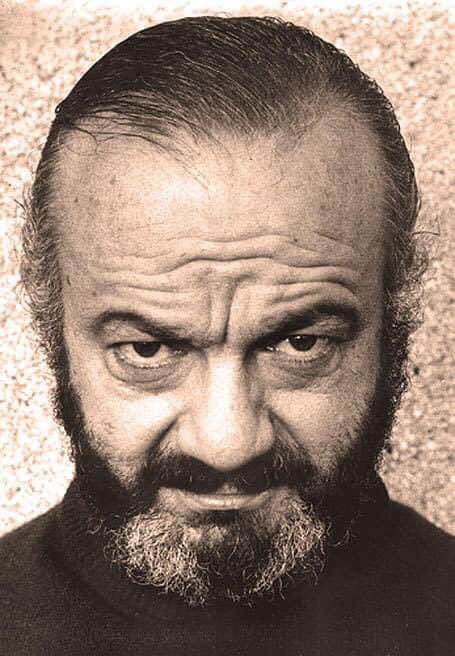
En 1990 grabó uno de sus últimos trabajos al lado del Kronos Quartet, durante su carrera trabajo con Gerry Mulligan, Gary Burton, Paquito D’Rivera, Andy González y un sin número de colaboradores de primer nivel.

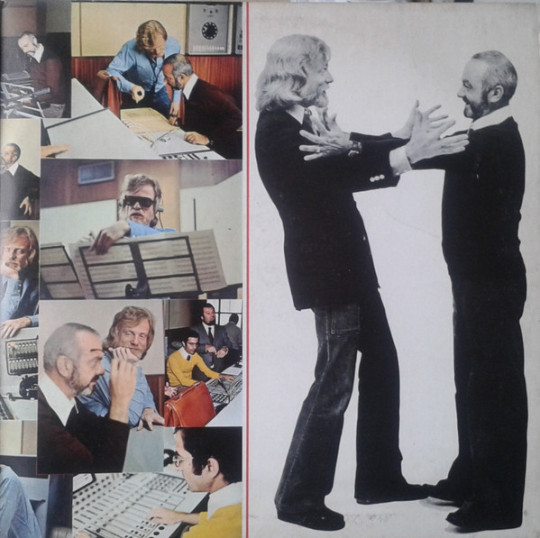
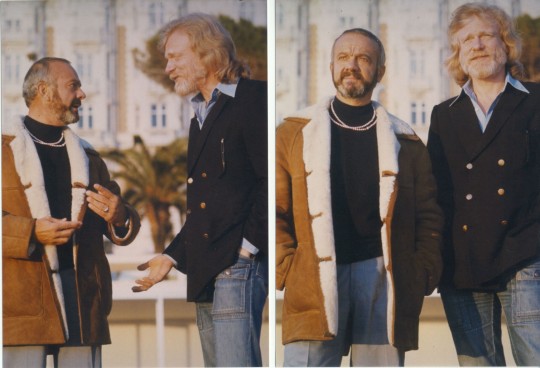
Astor Paizzolla grabo en 1974 el disco Summit Reunion junto a Gerry Mulligan con siete temas de Astor y uno de Gerry.
Mulligan era un fuerte bebedor y durante las sesiones chocó muchas veces contra el carácter obsesivo perfeccionista de Piazzolla.
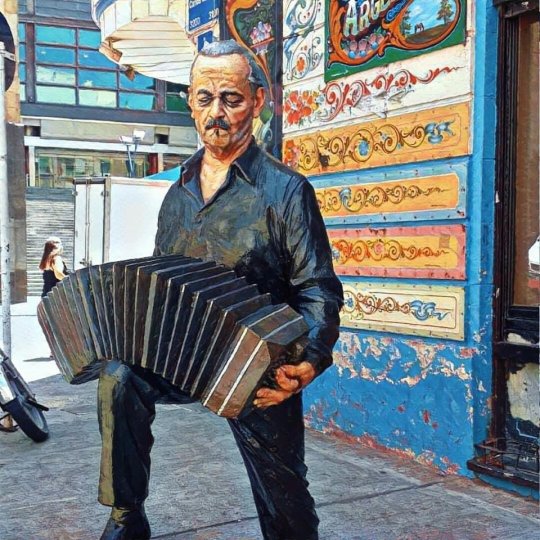
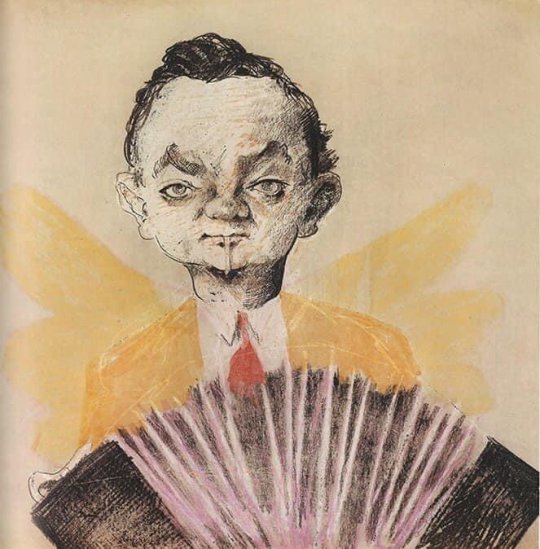
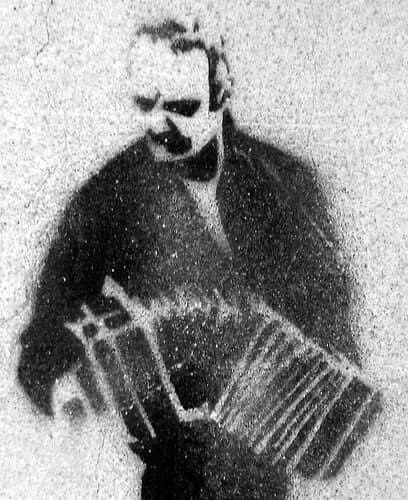
0 notes
Text
"Toda esta música latina bebe de lo clásico"

[El trompetista venezolano afincado en España Pacho Flores / JUAN MARTÍNEZ]
Estirpe, el último disco del trompetista Pacho Flores, tiene tres nominaciones en los Grammy Latinos que se entregan en unos días en Sevilla
No podrá estar en Sevilla el 16 de noviembre en la ceremonia de los Grammy Latinos, porque tiene un concierto lejos, pero Pacho Flores, el trompetista venezolano y español que reside hace años en Valencia, se siente ilusionado con las tres nominaciones de su último álbum, Estirpe, un recorrido por obras recientes de compositores hispanoamericanos.
–Es un disco puramente latino…
–Se trata de un proyecto verdaderamente hermoso, porque involucra a los que, para mí, son los grandes compositores actuales de la música hispana. El título de Estirpe es porque este repertorio es la raíz de todo ese nuevo repertorio con el que estamos pretendiendo conquistar las salas de concierto. Es muy difícil compaginar una carrera discográfica con lo que es tu carrera artística. Los proyectos que tú grabas no van de la mano de lo que las orquestas quieren programar. En este sentido considero que tengo mucha suerte, porque este repertorio que estamos generando ha llamado mucho la atención de todos los programadores de orquesta, salas de concierto y teatros.
–¿Puede hablarme de las obras?
–Arturo Márquez ha estado muy vinculado a Venezuela con su Danzón nº2. Recuerdo la primera vez que toqué esa obra, yo tenía 13 años, y ya soñaba con un concierto suyo de trompeta. Que Paquito D’Rivera, un gran ídolo para mí, me haya dedicado esta obra ha sido un gran honor. Luego hay amigos a los que conozco no hace tanto, pero con los que tengo ya una gran relación, como Daniel Freiberg. Cuando Paquito D’Rivera tocó aquí en Valencia sus Crónicas Latinoamericanas yo me enamoré de esa obra. Mestizo de Efrain Oscher lo estrené en 2010, que es realmente de donde nace todo este proyecto. Fue el primer gran concierto latinoamericano. Visto en perspectiva me da risa. Apenas utilicé tres trompetas. Ahora estamos usando entre ocho y diez trompetas por obra. Se ha evolucionado muchísimo en ese aspecto. Y para cerrar, una insistencia del maestro Prieto, que se enamoró de mi vals Morocota, porque pensaba que iría bien como cierre del disco. Una cosa muy importante es que los encargos a Paquito D’Rivera, Efrain Oscher y Arturo Márquez han sido a través de consorcios en que hemos involucrado a tres o cuatro orquestas por obra, lo cual ha sido un esfuerzo titánico. En el caso de Daniel Freiberg, se trataba de un concierto original para clarinete, y el encargo se lo hice yo personalmente, para transcribir y arreglar la obra. Él vino a España, y fue como volver a componerlo. Lo toco con cinco instrumentos, que parece realmente escrito para mi instrumento, así que esa nominación de Freiberg está más que merecida, porque él me decía que tenía miedo de dejar cosas en el camino, pero fue al contrario, hubo aportaciones, porque el concierto para clarinete está hecho para un solo instrumento: está ahí todo el virtuosismo, pero un solo color. Yo puedo mostrar cinco colores diferentes en la obra.

–Orquesta y director mexicanos...
–Creo que no existe mejor orquesta para grabar este proyecto que la Orquesta de Minería, que es una orquesta privada, que hace todos los esfuerzos para salir adelante, y el maestro Carlos Miguel Prieto, que está triunfando por todo el mundo. Además he tenido la dicha de grabar esto con Ingo Petry como productor, él es un gran productor alemán que vive en Suecia, y como guinda hacerlo para Deutsche Grammophon, que supone para cualquier artista clásico un prestigio enorme.
–¿Hay mucho mestizaje en esta música?
–Es algo hermoso porque se siente cómo toda esta música latina bebe de lo clásico. El Concerto Venezolano de Paquito D’Rivera y el Concierto de otoño de Arturo Márquez tienen unos fugatos espectaculares. El segundo movimiento del Concierto de otoño es una especie de danzón pero con forma de chacona. Estamos en un ambiente muy académico. El tercer movimiento de las Crónicas latinoamericanas o mi Morocota son valses, que nos llegan de Centroeuropa después de pasar por España y coger el barquito hasta América. Para el oyente no es difícil encontrar en estas melodías latinas un sentido vinculado a la música clásica. En cuanto a ritmos, tenemos desde Argentina, con las chacareras del segundo movimiento de Freiberg, a Norteamérica, con el swing y el bebop en el último movimiento de esa misma obra y entre medias los danzones, los valses y joropos venezolanos, esos sones jarochos que se confunden con los huapangos, esa conga mexicana... Tenemos un combo precioso de ritmos, colores y mestizajes.
–Doy por hecho que todas estas obras han sido tocadas en directo, ¿siempre antes de la grabación?
–Todas han sido tocadas y retocadas. La única que se grabó al día siguiente de la presentación fue la de Paquito D’Rivera: se estrenó el 1 de septiembre de 2019 y la grabamos al día siguiente en los Estudios Churubusco de Ciudad de Méjico, que era donde se hacían las películas de Cantinflas, así que son casi un museo. El Concierto de otoño lo he tocado ya 56 veces, desde que se estrenó a principios de 2019. El de Paquito creo que han sido 23 veces. De Mestizo he perdido la cuenta, pero más de 60 veces. Crónicas latinoamericanas al menos una docena de veces. Y si no la he tocado tanto es porque incluye un trío de jazz y los programadores de orquesta ya no se atreven tanto.
–¿Cuántos conciertos con orquesta está dando al año?
–Estoy en torno a 80-85.
–Me decía hace unos años que con las trompetas de cuatro pistones de Stomvi se habían adelantado 20 años. ¿En qué punto de desarrollo está toda esta nueva tecnología aplicada a su instrumento?
–Siempre estamos pensando muchísimo. En medio de la pandemia pudimos probar muchas de las cosas en las que trabajamos. Estos instrumentos que yo toco están ya en catálogo y cualquiera los puede adquirir, no son instrumentos especiales. Durante un tiempo, mientras probamos, son prototipos, pero ya no: desde la boquilla a la campana todo se puede adquirir y forman parte del catálogo de Stomvi. Lo último que hemos hecho ha sido el desarrollo de los fliscornos: el que había en la banda siempre era en si bemol, le pusimos cuatro pistones y hemos ampliado todas las posibilidades de transposición, los tenemos en do, fliscorninos en re y fliscornos graves en la. El año pasado hice el estreno de mi Concierto para fliscorno, que se titula Albares. En este tiempo he compuesto otras dos obras más: Cantos y revueltas y otra que se llama Heterónimos, que es una rapsodia concertante.
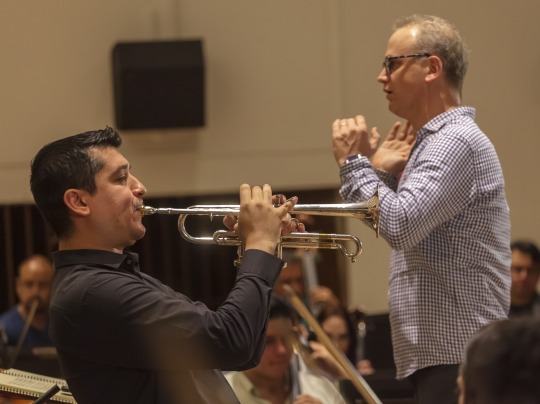
[Durante una sesión de grabación / LORENA ALCARAZ]
–¿Le gusta componer?
–Sigo mi sueño del desarrollo de las trompetas como creador, porque me gusta darle forma a estos colores, materializar a través de la música todo ese esfuerzo. Me gusta componer, es algo que puedo llevar simultáneamente a mi carrera de intérprete, porque no puedo estudiar ocho horas al día la trompeta. En eso somos como los cantantes. Tengo mucho tiempo libre en hoteles, aviones... y siempre estoy pensando, componiendo, haciendo arreglos. Aproximadamente el 70% de los arreglos que estoy tocando ahora son míos.
–¿Estas obras están escritas ya pensando en estos instrumentos nuevos?
–Totalmente. La trompeta en do tiene un gran papel en el Concierto de otoño, así como la corneta en fa. En el Concierto de Paquito D’Rivera, uso la corneta en do y pulimos mucho una corneta piccolo en sol. Él lo escribió para trompeta piccolo, porque era la que conocía, pero su música no hablaba así: le dije, maestro, el color que tiene usted en la cabeza no lo puede representar ese instrumento. Yo pensaba que necesitaba un instrumento coloratura, pero más grave y con más cuerpo, una corneta, y Vicente Honorato estuvo dándole forma rápidamente al instrumento; a Paquito le encantó. Para el Concierto de Freiberg estuvimos también desarrollando una corneta en re, porque necesitábamos un color spinto, pero con un poco de barítono. Necesitaba eso, ese instrumento me da tres octavas y media, que es lo que tiene el clarinete. Por otro lado, la obra de Efrain fue embrionaria para poder hacer el fliscorno de cuatro pistones.
youtube
–¿Todos estos instrumentos nuevos exigen un virtuosismo mayor?
–Lo complicado es aprender el sistema. Tienes que cambiar tu concepción del instrumento. Pero una vez que lo has hecho te está facilitando en realidad la tarea. Siempre hemos querido llevar todo a nuestra comodidad, pero eso tiene un límite. Hemos tenido que cambiar la plataforma para que a la larga esa nueva plataforma nos dé más comodidad. Estamos veinte años adelantados, le dije hace unos años, y lo estamos viendo, cada vez hay más solistas de orquestas de renombre en Europa y Estados Unidos que están recurriendo a este instrumento. Y los estudiantes cada vez preguntan más. Hay algo que me llena de alegría tanto como las nominaciones a los Grammy. Me escribieron desde el Conservatorio de Ginebra para decirme que una estudiante se quiere graduar con mi Cantos y revueltas. El consejo de estudio evaluó la obra y dijo que tenía todas las características adecuadas para que esta chica pudiera demostrar sus cualidades técnicas y musicales. Fue aprobada. Eso va generando camino. Para mí no es experimental, es parte de mi vida, pero para el profesor del conservatorio que no toca esos instrumentos, sí, así que se suma a ella para poder ayudarla y sacar adelante el proyecto. Eso me llena de felicidad.
–¿Algún otro proyecto de disco en marcha?
–Sí, estamos mezclando ya un disco precioso que grabé el año pasado con Carlos Paterson, el catedrático de órgano del Conservatorio de Valencia. Incluye obras barrocas, románticas, clásicas, además de una obra suya y otra mía como cierre. Y luego hay otros proyectos: no he hecho nunca un disco con piano ni con orquesta de cuerdas, y tengo muchas novias para hacer algo así. Puedo adelantarle que hay algo con la Orquesta de Liverpool.
[Diario de Sevilla. 29-10-2023]
ESTIRPE EN SPOTIFY
#pacho flores#orquesta sinfónica de minería#carlos miguel prieto#deutsche grammophon#arturo márquez#daniel freiberg#paquito d'rivera#efrain oscher#música#music#Youtube
0 notes
Text
Laurence Elder “Walk Another Mile”

Laurence Elder has released “Walk Another Mile” (Steel Canyon) the follow up to his #1 debut single “Now”. Ever since early memories of being eye-level with the Steinway piano keys in his parents’ living room, Laurence Elder was hooked on music. He grew up listening to his guitarist/singer mom belting out Bob Dylan tunes, and his classical pianist dad playing Mozart and Chopin as he would drift off to sleep at night. He took lessons on and off, but relied largely on his ears as he picked up songs of various styles, playing in school productions, jam sessions, and family gatherings. After joining a band in his late teens and getting his first real taste of live performance, music had established itself as a true calling and he never looked back. Fast-forward to Laurence becoming a critically acclaimed songwriter, vocalist, and pianist, whose fresh, inspired cross-genre blend of jazz, pop, blues and rock helped to define the original sound that won him international acclaim with his debut album, “Surrounded.” He has toured extensively, and recorded with Grammy winners Peter Erskine and Paquito D’Rivera, who both appear as guests on that first release. Radio is set to get his very best in 2023 with “Walk Another Mile”. Additional Artist/Song Information: Artist Name: Laurence Elder Song Title: Walk Another Mile Publishing: Laurence Elder Music Publishing Affiliation: BMI Album Title: Walk Another Mile Record Label: Steel Canyon Record Label: Steel Canyon Records Larry A Weir 3236587449 [email protected] Radio Promotion: National Record Promotion Larry A Weir 3236587449 [email protected] Read the full article
0 notes
Link
#eltrio #paulomoreira #PaquitoDRivera #cuba #musica #jazz #music #institutoling #showonline #portaljornale #jornale
1 note
·
View note
Text
Y otro poema de los dones
Mi querido @PaquitoDRivera —tú que alegras los días de esta vida y rescatas a diario la perdida costumbre que antes fue imperecedera de dar sin esperar a cambio nada—, tu regalo llegó por el correo. Tu bondad es reliquia de museo. Mi gratitud va...
Yo con PaqMan y ambos con Venezuela Mi querido Paquito D’Rivera—tú que alegras los días de esta viday rescatas a diario la perdidacostumbre que antes fue imperecedera de dar sin esperar a cambio nada—,tu regalo llegó por el correo.Tu bondad es reliquia de museo.Mi gratitud va en esta marejada: tu música rebota en las paredes—la escucho y cierta dicha me rebasa—,trompeta, bajo, saxo y…

View On WordPress
0 notes
Audio
Anat Cohen
Claroscuro
Anzic Records, 2012
Anat Cohen: Clarinet, Bass Clarinet, Soprano & Tenor Saxophone Jason Lindner: Piano Joe Martin: Bass Daniel Freedman: Drums Paquito D’Rivera: Clarinet (5,7,9 & 10) Wycliffe Gordon: Trombone (2 & 7), Vocal (2) Gilmar Gomes: Percussion (6, 9 & 10)
Art begets art on Anat Cohen's Claroscuro. The Israeli-born, New York-based multi-reedist leaves the confines of Benny Goodman's world behind, following her clarinet-only sojourn into king of swing territory, Clarinetwork: Live At The Village Vanguard (Anzic, 2010), with a wide-ranging musical treatise on the balance between light and dark. Cohen addresses each end of the color spectrum on its own terms during this eleven-song program but, more often than not, plays one off the other within a single performance. She's savvy enough to know that dark doesn't exist without light and that the contrast and marriage between the two is what makes them stand apart. Jason Lindner's "Anat's Dance" opens the program and focuses on Cohen's sunny clarinet work, Lindner's moody piano and the shifting rhythmic terra firma that morphs beneath them. Cohen's bass clarinet connects with Paquito D'Rivera's clarinet as they move over a primal percussion foundation on her "Kick Off, while pan-global rhythmic purpose and open exploration collide on drummer Daniel Freedman's "All Brothers." These prove to be the only originals on this album, but originality resides in every second of music. Cohen delivers her most soulful tenor performance to date on "The Wedding," produces some poignant soprano work at the start of "Tudo Que Voce Podia Ser," and walks a line between seductive and mournful on "As Rosas Nao Falam." She shares a deep and abiding love for choro music with D'Rivera ("Um A Zero"), engages in a Louis Armstrong-based love affair with trombonist/vocalist Wycliffe Gordon ("La Vie En Rose") and calls on her famous Cuban clarinet companion again for a trip through clarinetist Artie Shaw's psychosis-slathered theme song ("Nightmare"). Both men join Cohen on one track, Dr. Lonnie Smith's "And The World Weeps," and the results are electric; the song goes from mannered dirge to bluesy epic in Duke Ellingtonian fashion. Cohen's omnivorous musical persona is well-documented on Notes From The Village (Anzic, 2008), where she jumped from saxophonist John Coltrane and singer Sam Cooke to pianist Fats Waller with ease, and Noir (Anzic, 2007), where she hit a homerun merging "Samba de Orfeu" and "Struttin' With Some Barbeque," but she works the musical diversity concept in a different way on this one. Notes From The Village was pleasing in a hard-to-pin-down way and Noir was fueled by passion, but Claroscuro succeeds on poise and shapeliness. The unrestrained enthusiasm that Cohen beautifully exhibits in other places is replaced here by a more deliberate and controlled balance of highs and lows, ups and downs....and light and dark. Claroscuro is a colorful date that confirms what's already been said about Anat Cohen on numerous occasions: she's one of a kind.
DAN BILAWSKY in allaboutjazz.com
#Anat Cohen#Jason Lindner#Joe Martin#Daniel Freedman#Paquito D’Rivera#Wycliffe Gordon#Gilmar Gomes#Claroscuro#Anzic Records#DAN BILAWSKY#allaboutjazz.com#discos#spotify
11 notes
·
View notes
Text
Legendary Hip-Hop Artist Black Thought of The Roots to Give Free Master Classes for MCs from February 3-5, 2020
Legendary Hip-Hop Artist Black Thought of The Roots to Give Free Master Classes for MCs from February 3-5, 2020

Classes are Part of Carnegie Hall’s Series of Artist Training Workshops and Provides Unique Opportunity for Rising Artists to Train with Black Thought, Developing Artistry, Examining Technical Skills, and Exploring the History of Hip-Hop MCs Invited to Apply by December 6; Applications Now Open Online
Carnegie Hall’s Weill Music Institute announced that legendary hip-hop artist Black Th…
View On WordPress
#Abdullah Ibrahim#“School of Thought: A Hip-Hop Master Class Featuring Black Thought”#Beatrice Santo Domingo#Bobby McFerrin#Brad Mehldau#Carnegie Hall’s Weill Music Institute#Hip-Hop: The Songs That Shook America#Joyce DiDonato#Legendary Hip-Hop Artist Black Thought of The Roots#Marilyn Horne#Mr. and Mrs. Anthony B. Evnin and A.E. Charitable Foundation#Mr. and Mrs. Nicola Bulgari#Paquito d’Rivera#Questlove#RENEE FLEMING#Tariq Trotter#Zakir Hussain
0 notes
Photo

Paquito D’Rivera With James Moody – Who’s Smoking?!
"The answer to this CD's title is the musicians. The heated bebop-oriented session finds Paquito D'Rivera joined by trumpeter Claudio Roditi, flügelhornist Mark Morganelli, Danilo Perez or Pedrito Lopez on piano, bassist Harvie Swartz, and drummer Al Foster. An extra treat is that veteran tenorman James Moody guests on three of the nine selections, inspiring D'Rivera to be particularly heated. Highlights include exciting versions of "Giant Steps" and "I Mean You," a clarinet-bass duet on "Out of Nowhere," Perez's "You Got It, Diz," and the blazing title cut. Highly recommended." - Scott Yanow/AllMusic.
8 notes
·
View notes
Text
Chucho Valdés Trio Live in NYC (Full Concert) | Jazz Icons at Trinity Church, Wall Street

Chucho Valdés Trio Live in NYC (Full Concert) | Jazz Icons at Trinity Church, Wall Street.
https://www.youtube.com/watch?v=Zqfmo0ZlyCw Chucho Valdés Trio. Cuban pianist, composer, and arranger Cuban pianist, composer, and arranger Chucho Valdés is the most influential figure in modern Afro-Cuban jazz. He is perhaps best known for helming the iconic Cuban ensemble Irakere (1973–2005). In a career spanning more than 60 years, Valdés has distilled elements of the Afro-Cuban music tradition, jazz, classical music, rock, and more into a deeply personal style. He is joined by bassist Jose Armando Gola and percussionist Roberto Vizcaíno Jr. for what is sure to be a transcendent performance. The concert is presented in collaboration with JAZZ HOUSE KiDS.

Winner of seven GRAMMY® and five Latin GRAMMY® Awards, Mr. Valdés, received a Lifetime Achievement Award from the Latin Academy of Recording Arts & Science last year and was also inducted into the Latin Songwriters Hall of Fame. Mr. Valdés celebrated his 80th birthday on October 9, 2021, completing La Creación (The Creation), a three-movement suite for a small ensemble, voices, and a big band. The piece, the most ambitious work of his career, tells the history of Creation according to the Regla de Ocha, the Afro-Cuban religion known as Santería.

The Creation was a commission of the Adrianne Arsht Center for the Performing Arts of Miami-Dade County, the John F. Kennedy Center for the Performing Arts in Washington, DC, the Chicago Symphony Center, and the Los Angeles Philharmonic Association. It had its world premiere on November 5, 2021, at the Adrienne Arsht Center.

Performances followed in several U.S. cities, including Jazz at Lincoln Center in New York City, the Detroit Jazz Festival in Detroit, MI, and the Monterey Jazz Festival, in Monterey, CA. In Europe, the tour began at the Philharmonie in Paris and included performances in Berlin, London, Hamburg, Lyon, and Barcelona (Mr. Valdés is the godfather of the International Jazz Festival). Another significant recent development was the long-awaited reunion with his old friend and co-conspirator in many musical adventures, the extraordinary clarinetist, saxophonist, and composer Paquito D’Rivera. They have rarely played together for the past 40 years, and since their reunion, they have wasted no time. In January 2022, they recorded an album entitled I Missed You Too, and embarked on a tour with their Reunion Sextet that took them to Europe and the United States. Born in a family of musicians in Quivicán, Havana province, Cuba, on October 9, 1941, Dionisio Jesús “Chucho” Valdés Rodríguez, has distilled elements of the Afro-Cuban music tradition, jazz, classical music, and rock into an organic, deeply personal style. His first teacher was his father, the pianist, composer, and bandleader Ramón “Bebo” Valdés. By the age of three, Mr. Valdés was already playing on the piano melodies he heard on the radio — using both hands and on any key. He began taking lessons on piano, theory, and solfege at the age of five. He continued his formal musical education at the Conservatorio Municipal de Música de la Habana, from which he graduated at 14. A year later, Mr. Valdés formed his first jazz trio. In 1959, he debuted professionally with the band Sabor de Cuba. The ensemble, directed by his father, is widely considered one of the great orchestras in modern Cuban music. Fittingly, Mr. Valdés made his early mark as the founder, pianist, and leading composer and arranger of another landmark ensemble: the small big band Irakere (1973-2005). With its audacious mix of Afro-Cuban ritual music, Cuban dance music, jazz, classical music, and rock, Irakere marked a before and after in Latin jazz. Irakere’s self-titled debut recording in the United States won a Grammy as Best Latin Recording in 1979. While he remained with Irakere until 2005, Mr. Valdés launched a parallel career in 1998 both as a solo performer and a small-group leader. It marked the beginning of an enormously fruitful period highlighted by albums such as Solo Piano (Blue Note, 1991), Solo: Live in New York (Blue Note, 2001), as well as quartet recordings such as Bele Bele en La Habana (Blue Note, 1998), Briyumba Palo Congo (Blue Note, 1999), New Conceptions (Blue Note, 2003), and Live at the Village Vanguard (Blue Note, 2000), which won a Grammy for Best Latin Jazz Album. After leaving Irakere, Mr. Valdés also won Grammys for Juntos Para Siempre (Calle 54, 2007), the duet recording with his father, Bebo; and, Chucho’s Steps (Comanche, 2010), which introduced his new group, the Afro-Cuban Messengers. But such success didn’t mean forgetting past achievements. In 2015, Mr. Valdés celebrated the 40th anniversary of the birth of Irakere, his iconic band, with a world tour. Tribute to Irakere: Live at Marciac (Jazz Village / Comanche Music), which captured a performance on that tour, won a Grammy for the Best Latin Jazz Album in 2016. He also won a Latin Grammy as Best Latin Jazz album for Jazz Batá 2, in which he revisited a revolutionary idea Mr. Valdés first recorded in 1972: a piano jazz trio featuring batá drums. In 2022, Chucho Valdés won a Grammy and a Latin Grammy for Mirror Mirror, an album of duets by pianist and singer Eliane Elias with Mr. Valdés and the great late pianist Chick Corea. Read the full article
#SMLPDF#noten#partitura#sheetmusicdownload#sheetmusicscoredownloadpartiturapartitionspartitinoten楽譜망할음악ноты#spartiti
0 notes
Text
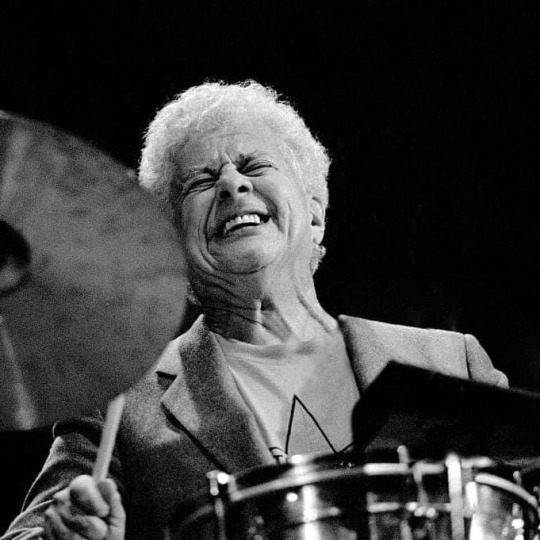
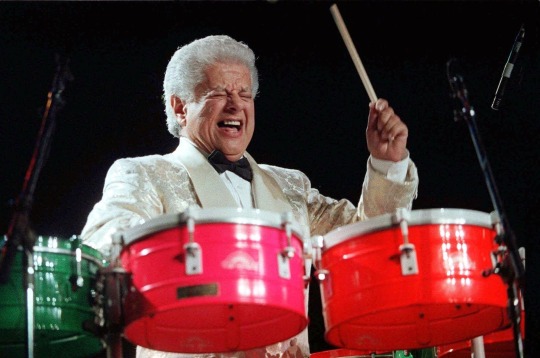
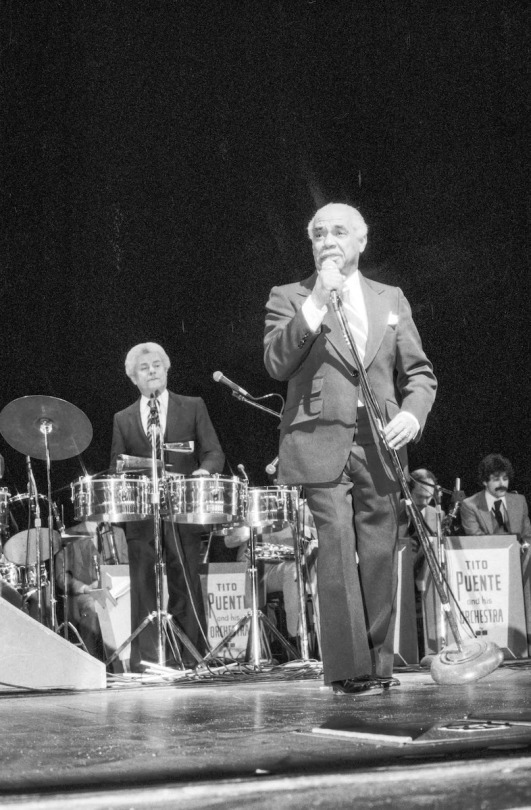
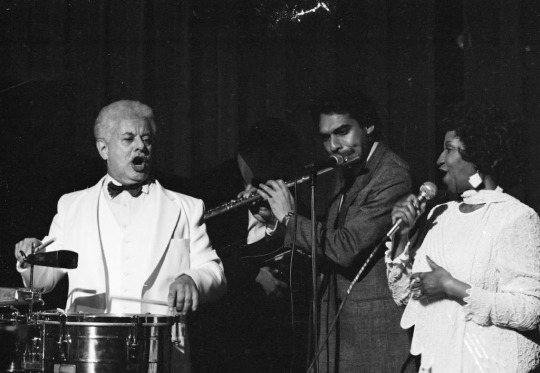
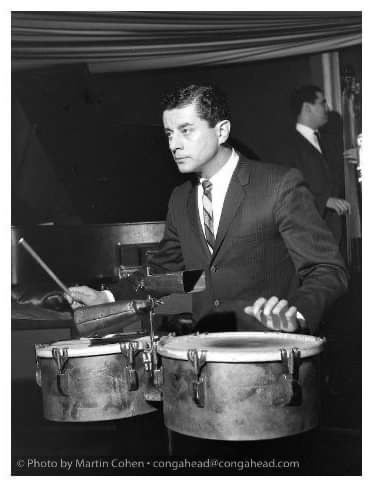
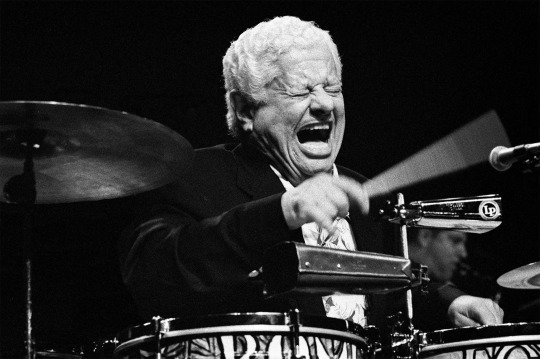
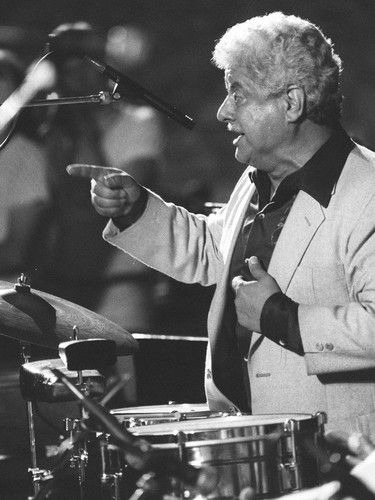
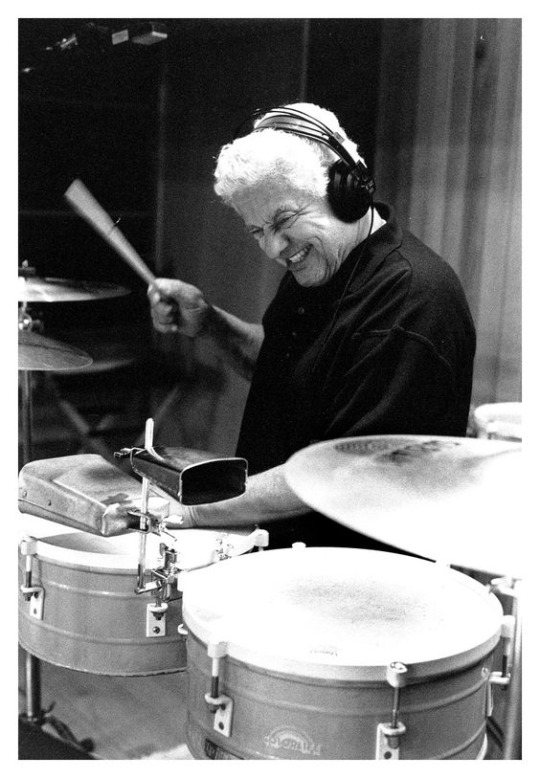
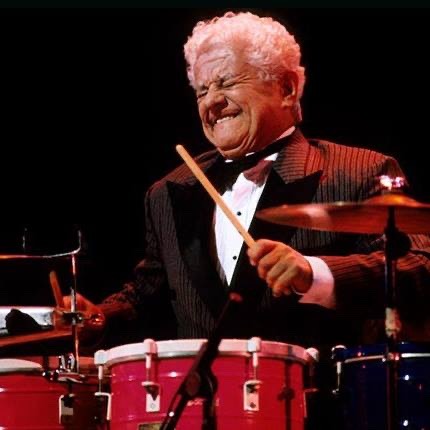
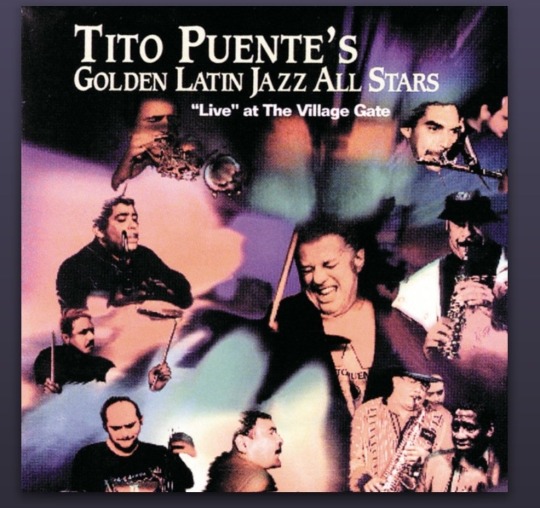
«Nosotros, los latinos, al incorporar la percusión, le dimos un ritmo más excitante al jazz».
- Tito Puente
Un día como hoy mayo 31 de 2000 muere a los 77 años de edad, en New York City, Ernesto Antonio Puente, mejor conocido como Tito Puente, percusionista estadounidense de origen puertorriqueño, discípulo de Mario Bauza, se adentró en los ritmos afrocubanos bajo la instrucción del gran Changuito Quintana, incursiono en el mambo, salsa, guaracha, pachanga, jazz afrocubano y jazz latino.
Entre sus mejores álbum se encuentra Live at Birdland, Salsa meets Jazz, Top Percussion, Dancemania, Para los rumberos, Golden Latín Jazz All Stars acompañado de destacadas figuras como Paquito D’Rivera, Claudio Roditti, Giovanni Hidalgo, Dave Valentín, Andy González, Mongo Santamaría entre otros, así como un destacado proyecto para la marca de instrumentos musicales LP llamado Latin Percussion Jazz Ensemble acompañado de importantes músicos como el pianista Jorge Dalto, Carlos Patato Valdés.
#jazz#latínjazz#latin jazz#afrocuban jazz#afrocubanas#tito puente#percussion#Percussion player#timbales#timbal player
5 notes
·
View notes
Photo

[#CONCERT] Celebrate Culture! Los Sueños del Caribe (Dreams of the Caribbean): People, Land, and Place May 13, 2017 | 12-5pm Milstein Hall of Ocean Life | American Museum of Natural History | Central Park West at 79th Street New York, NY 10024 Admission: Free for Members or with Museum Admission
Celebrate the natural and cultural diversity of the Caribbean at a family-friendly festival! Enjoy activities and the premiere of a new work of music and poetry co-developed by Grammy-winning Cuban-American jazz legend Paquito D’Rivera and students from the Celia Cruz Bronx High School of Music. Enjoy Paquito D’Rivera’s lively “Tico! Tico!” performed at Jazz at Lincoln Center as part of D’Rivera’s “Tribute to Charlie Parker with Strings” concert.
youtube
#concert#Los Sueños del Caribe#Milstein Hall of Ocean Life#American Museum of Natural History#Caribbean festival#Paquito D’Rivera#Celia Cruz Bronx High School of Music
0 notes
Text
Tweeted
Paquito D’Rivera defies categorization. https://t.co/euYcjVabhW Join @PaquitoDRivera at @officialronnies from 17-19 July 👉 https://t.co/rs5kjWMqqZ
— Ronnie Scott's Jazz Club (@officialronnies) July 8, 2019
1 note
·
View note
Text
Exilio y desexilio: Lección 51
Me puse una guayabera para hablar de tus lecciones y en nuestras conversaciones sobre el arte de la espera pensé en aquella quimera de lo que pudo haber sido si en lugar de haber vivido en dos lenguas, deslenguado, tal vez me hubiese quedado...
Con Paquito D’Rivera y Brenda Feliciano, hablando de lo humano y lo divino A Gustavo Pérez Firmat, por sus 50 lecciones… Me puse una guayabera para hablar de tus lecciones y en nuestras conversaciones sobre el arte de la espera pensé en aquella quimera de lo que pudo haber sido si en lugar de haber vivido en dos lenguas, deslenguado, tal vez me hubiese quedado cuál azulejo en su nido.

View On WordPress
0 notes